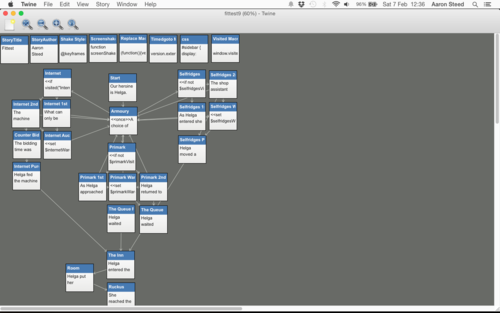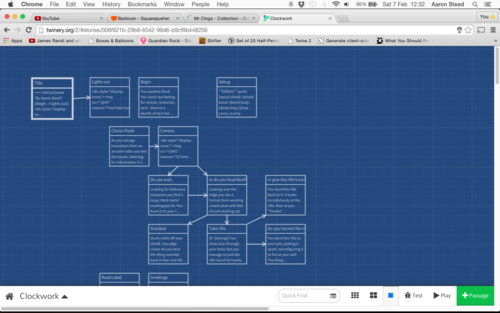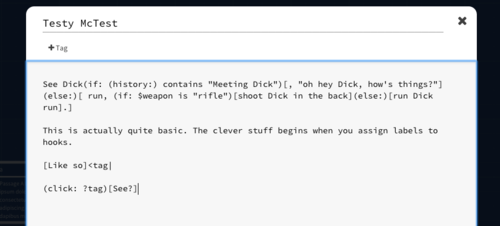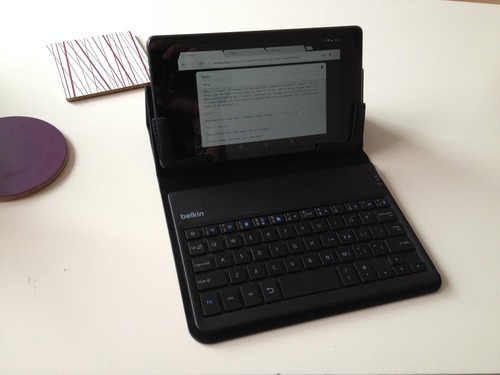
Featured Blog | This community-written post highlights the best of what the game industry has to offer. Read more like it on the Game Developer Blogs or learn how to Submit Your Own Blog Post
st33d on Twine 2
Has the easiest way to make a game gotten easier? In this article share my thoughts on the user experience of Twine 2 compared to Twine 1.

If you hadn't heard already, Twine 2 was released and I made an adventure in it. I mostly make puzzle games and platformers but I was inspired to do another Twine by Inkle's Sorcery! which I had a great time playing. (Pity that their Inkle writer is too bloated to use on a tablet.) A few old hats have asked me how it compares (seeing as I've already made a game in Twine 1) so I thought I'd give you all a write up. I don't know the creators of Twine 1 or 2 personally, and it will show.
What's a Twine?
Ah yes - some of you may need a preamble.
Twine games are like those Choose Your Own Adventure books of old, but you get to play them in your browser. So rather than thumbing through pages to find out where your choice leads next, you get to simply click on an option and get back to the plot. You can make a Twine game very easily with the Twine editor:

It's the simplest of game formats - you pare down a gaming experience to a few states (still more complex than a quicktime event though). You also get an opportunity for great story because you fundamentally experience it like a book.
There's lots of of Twines out there for you to try - a couple of favourites: If you want a smartly written adventure game (with a side story that bares its soul on the escapism of games of our youth) then try Porpentine's Ultra Business Tycoon III (you'll need this to finish it). And an excellently disturbing tale can be found in Michael Lutz' My Father's Long, Long Legs - don't read before bedtime.
Anyway, back to the central question:
Is Twine 2 any good?
Yes! It runs completely in the browser now. This means you can work on lots of different platforms - even tablets, though with some caveats for the latter. Projects stay all stored in the browser's cache (actually having a list of projects to choose from is a big upgrade) and you can save out a compressed archive to load up in any browser. The interface looks all swish and designery with a cyanotype motif to the passage workspace - a passage being a node in the story.

It sort of reminds me of blogging - because of course you don't get those pop up windows for editing text like in Twine 1. Instead you get a Tumblr style window to type into which... almost works. You can set a custom launch point, start a story from any passage to debug it and micro manage passages much easier. The CSS and Javascript hackiness is now relegated to the menu bar so it no longer feels like you're doing something unnatural when you're customising the story. The language (or languages) to write Twine has (have) also been given an overhaul. There's still the familiar Sugarcane format - now Sugarcube - and Leon Arnot's Harlowe, which is a new way to write Twines with far more fidelity than possible before. There's also a minimal version called Snowman which allows you to use Javascript (but you could use Javascript before you say - we'll get to that). Those are just the most salient features.
Wait a minute... Caveats? Almost works?
Ugh. Yes. It happens to them all. Don't get me wrong, we're not in MonoDevelop for Unity territory here, it's not batshit insane with no hope of ever being fixed. But it does have bugs. Sometimes a passage goes walkabout in the layout when you return to the project. Sometimes one of the languages has an error in it and you have to go on the forum to beg for a fix (like all other languages - ever). There are also some design decisions here that are hard for me to wrap my head around as well, like Harlowe.
What's up with Harlowe?
How do I feel? I guess friend-zoned is the most accurate way of putting it. Harlowe does something amazing with writing Interactive Fiction that Twine 1 doesn't. It lets you spin on a dime. Mid-sentence you can branch out into many timelines - it takes the concept of passages and allows you to make passages within those passages called "hooks" using a simple markup of square brackets. You can then manipulate them with dollar prefixed variables and macro commands followed by a colon in parenthesis. Most of the endings to my last project had multiple endings within the endings because of actions you took before. Rather than repeat myself in a new passage I was allowed to make lots of subtle changes smack bang in the middle of a block.

You couldn't do this in Twine 1, the formatting was designed to break everything into paragraphs. It took the Choose Your Own Adventure format and rigidly stuck to it. I even blogged an extension you can use to get around it. This was an idea I had after fruitlessly asking Cara Ellison for help on how to do it... because I was too scared to ask her to critique my boob jokes in the Twine I was writing at the time. It had never occurred to her the need to do this (sentence manipulation, not boob jokes). And I guess it doesn't occur to most Twine 1 users because the tools aren't there. Harlowe I think can change that.
But you can't customise Harlowe like you can Twine 1.
And that is the point where I want to grab Leon Arnot by his figurative lapels and shake him furiously whilst screaming, why?
I don't know the roadmap for Harlowe. I think it's great and I can't begin to imagine how I'd go about programming such a language myself. But it comes with the shortfall that you may hit a point where you say - "but I want to do THIS." And at the time of writing it won't hear you. You can't add some Javascript to the page to fix it. I've tried with some success but it's a very ugly solution and it's pretty flaky.
Do try Harlowe, but don't get attached, he may not put out.
So Sugarcube?
If you're familiar with writing for Sugarcane then this should be up your street. The author is very active on the forum and has also posted some sweet hacks for people hitting the wall with their ideas. I haven't had the chance to properly try it because it didn't exist for Twine 2 at launch and it took me a month and a half of spare time to write the Harlowe piece. You should be okay though, it looks like the right choice for large projects that want customisation.
What about Jonah?
Good question. No sign of the loo-roll feed of text that was the Jonah format. I played some very good Jonah Twines so its omission from Twine 2 is glaring. Let's hope someone contributes a Jocube or Whale to the languages - that would be lovely.
I remember you about to complain about the Tumblr window?
Yes - the Javascript and CSS input is very flaky on iPad, to the point of being impossible to edit at all. On Android it mostly worked but still bugged out placing the cursor. Editing passages was mostly okay. I think it's the code highlighting it tries to do for CSS and Javascript that buggers it up.
iPad? Android? Wat?
Oh ho! Yes. I haven't introduced you to my writing machine yet:

A Nexus 7 in a Belkin keyboard case. I worked on iPad with a keyboard for a while but unfortunately Twine 2 on iPad currently cannot load archives - because Apple. You can save out to an app like Dropbox or Google Drive however. So I finished the project on the new Nexus and keyboard I'd recently bought - which is altogether a much more seamless experience.
This I think is Twine 2's greatest feature - comfort. Being able to curl up on the sofa and just have ideas whilst you type. Being able to pull your Twine out of your bag and make adjustments when you think of something new. Being able to sit down in front of any computer with a browser, anywhere, and make Twines. Not simply empowering those who've not made a game before, but anyone with the barest of means.
It's not original. Puzzlescript did it. Wonderfl did it. But it's great to see Twine get on board and lowering the barrier to entry.
So should I use it or not?
Definitely. I have my reservations, but they pall in comparison to the issues of other game making platforms. Give it a go, and if you get stuck with your Harlowe syntax, I may be able to help you out.
Read more about:
Featured BlogsAbout the Author(s)
You May Also Like







.jpeg?width=700&auto=webp&quality=80&disable=upscale)








